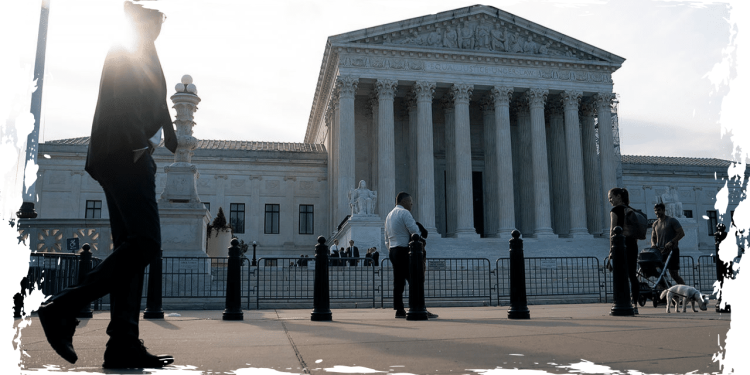On Thursday, the 7-2 verdict from the Supreme Court affirmed a provision within ex-President Trump’s comprehensive tax bill from 2017. However, the court avoided addressing a more significant concern about Congress’s overall power to tax.
In a recent decision, the high court refrained from delving into the definition of “income” that can be subjected to federal taxation under the 16th Amendment. This has significant implications for various sections of the U.S. tax code and could potentially eliminate the possibility of implementing a wealth tax.
In his majority opinion, Justice Brett Kavanaugh did not address the question of whether the 16th Amendment enforces a realization requirement. Rather, he focused on a specific aspect of the law’s mandatory repatriation tax, in response to a challenge brought by a couple.
Kavanaugh’s statement addressed a specific question before the court: Can Congress assign an entity’s realized and undistributed income to its shareholders or partners and subsequently impose taxes on them for their share of that income?
According to both Congress’s longstanding practice and this Court’s precedents, the answer to this question is a resounding yes.
Chief Justice John Roberts and the three liberals on the court joined Kavanaugh’s opinion.
While most of the justices didn’t tackle the larger constitutional issue at hand, the conservative justices, all four of them, did share their view that the 16th Amendment does impose a realization requirement. Justice Clarence Thomas dissented, supported by Justice Neil Gorsuch, and agreed with the Moores’ argument, stating that the 16th Amendment only includes income that has been realized by the taxpayer.
Justice Amy Coney Barrett, along with Justice Samuel Alito, concurred with their two conservative colleagues and dismissed the government’s claim that the amendment allows Congress to tax unrealized income without dividing it among the states.
Barrett wrote that the answer is a simple “No”.
Despite conceding a key point during oral arguments, Barrett and Alito voted to uphold the tax alongside the majority. They opined that the couple failed to meet their burden, leading to their decision.
In a separate opinion, Justice Ketanji Brown Jackson, who sided with the majority in upholding the tax, expressed reservations about the implementation of a realization requirement.
Jackson expressed her confidence that in the future, taxes will continue to be passed by Congress and signed by Presidents, which may cause outrage among certain groups. Some may argue that the taxes demand too much, while others may feel that they do not ask for enough. Jackson acknowledged that there may even be taxes that everyone agrees are misguided. However, she emphasized that the Supreme Court’s involvement in such conflicts should be restricted, citing the Pollock case as a significant precedent involved in this matter.
The Supreme Court received a challenge from Charles and Kathleen Moore, who were required to pay around $15,000 in taxes due to a provision in the 2017 law passed by Republicans.
The American government implemented a compulsory repatriation tax on individuals who owned shares in foreign corporations. This tax was a one-time payment, regardless of whether the corporation had distributed any earnings to the taxpayer.
The Indian company, KisanKraft, specialized in farm equipment, and the Moores had invested in it. However, despite their investment, the couple never received any distributions or payments from the company. This meant that they did not earn any income that the federal government could have taxed.
According to the 16th Amendment of the Constitution, Congress has the power to impose taxes on incomes from any source. However, any other direct taxes must be distributed among the states based on their population.
It remains unclear whether the carveout provided by the Amendment applies only to realized income, as the Supreme Court’s ruling did not address this issue.
The Moores were not favored by the justices as they ruled against them, stating that their income had been realized. According to the court, KisanKraft was responsible for realizing the income and Congress had rightfully attributed it to the Moores.
In the past, Alito had declined requests to step down from the case despite having had two meetings with a lawyer who represented the couple involved.










